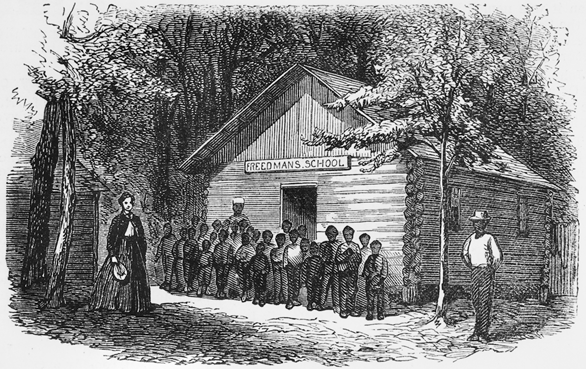The Freedmen’s Bureau
“After the end of the Civil War and the outlawing of enslavement, the United States went through a process known as Reconstruction, a period of rebuilding and reuniting the country. Abraham Lincoln had begun this process during the Civil War. But Lincoln’s assassination in April 1865 put Reconstruction in the hands of his vice-president, Andrew Johnson, and Republicans in Congress. Johnson wanted to keep white people in charge of the South and opposed giving equal political rights to African Americans.
Former enslavers refused to acknowledge African Americans’ new freedom. In every ex-Confederate state, white southerners passed laws called “Black Codes.” Black Codes included vagrancy laws that allowed police to arrest any Black person without an employer and force them to work.
Radical Republicans in Congress would have to force former enslavers in the South to treat the formerly enslaved fairly, equally, and w/ basic human dignity. Republicans briefly considered passing laws that would take away land from wealthy Confederates and give it to formerly enslaved. Immediately before the end of the Civil War, Congress created the Bureau of Refugees, Freedmen, and Abandoned Lands to provide for the welfare of formerly enslaved African Americans, including through “issues of provisions, clothing, and fuel, as [necessary].
Commonly known as the Freedmen’s Bureau, the agency had the authority to supervise labor relations in the South, with the mandate to provide education, medical care, and legal protections for formerly enslaved African Americans. The original goal of the Freedmen’s Bureau Act was the more radical notion of allowing African Americans the means to become self-sufficient.
At the end of the Civil War, Union General Sherman issued Special Field Order No. 15, setting aside 400k acres of land for those who had been freed, and 2 months later, the Freedmen’s Bureau formalized the order, providing that each negro might have 40 acres at a low price.
Office of Superintendent of Freedmen: “In accordance with Major General Sherman’s Order No. 15, permission is hereby granted to Richard Brown to take possession of and occupy forty acres of land, situated in St. Andrews Parish, Island of James, South Carolina.
The Bureau assisted over one million African Americans, including many of the nearly four million emancipated slaves, which was over 25% of the population of former slaves in America.”
“After the end of the Civil War and the outlawing of enslavement, the United States went through a process known as Reconstruction, a period of rebuilding and reuniting the country. Abraham Lincoln had begun this process during the Civil War.”
— Kamilah V. Moore, Esq. (@KamilahVMoore) January 7, 2023
Learn more: https://t.co/1jZZbj3EAM pic.twitter.com/RHqjDAqHlD
https://www.archives.gov/files/research/african-americans/freedmens-bureau/brochure.pdf
